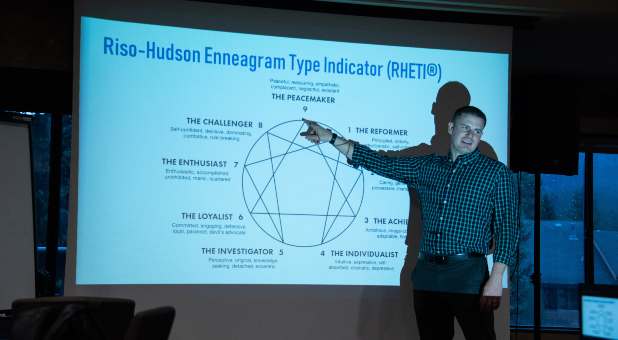The New Christian Enneagram Trend: Helpful Tool or Godless Wisdom?
There’s no denying that our culture is obsessed with self-assessment and personality typologies. There are countless systems that claim to support every aspect of life, from Myers-Briggs for interpersonal relationships to DISC or Strengths Finder for work communication and team-building strategies. However, one especially unique system, the Enneagram, corners the market for spiritual assessment. The Enneagram is an ancient psychological model for understanding personality that identifies nine personality types ranging from 1 to 9. These nine archetypes break out our “tragic flaws” and sin tendencies which we cloud with learned behaviors and coping techniques.
The unique claim of the Enneagram is its ability to dive under the surface of personality and culture and peer into our core identity and lens on the world. These consist of our root motivations, fears, strengths and weaknesses.
Although the Enneagram has been in existence for several hundred years, in the last couple decades, its popularity in the Christian community has skyrocketed. Its ease of unearthing critical motivations and sin tendencies that shape our understanding of the world, experts claim, can ultimately better connect us to God and thus lead to spiritual growth. Franciscan Rev. Richard Rohr is attributed responsibility for bridging study of the Enneagram through a Christian lens when he published The Enneagram: A Christian Perspective in 1990. Some even describe the Enneagram’s 9 types as essentially “nine paths to God”—roads to understanding our true selves and thus God’s design.
Pastors, authors and speakers, Christian counselors and psychologists are increasingly leaning on teachings of the Enneagram in their practices. Renowned author and Christian Enneagram expert Chris Heuertz stated in an interview with Religion News: “The Enneagram shows us our ego’s set of coping addictions that we’ve wrapped up around a childhood wound so that we don’t have to be truthful about the pain it’s caused us. Until we’re honest about this, we lie to ourselves and others about who we really are.”
However, despite the Enneagram’s growing popularity, there lies a deep well of controversy among Christians.
The biggest cause for controversy is in the system’s origins. There’s been no substantiated history, but researchers have attempted to piece together its roots.
Rumors claim the Enneagram appeared over 6,000 years ago in ancient Egypt or prehistoric Korea over 4,000 years ago. Christian scholars claim the system was developed by the early church’s desert mothers and fathers. However, Buddhists claim Sufis of central Asia are responsible for the system. Furthermore, skeptics in the faith community assert the belief that its roots are from the occult.
The only tangible history and application of the Enneagram we can rely on have come in the last 70 years. Modern use of the system has allowed many to apply various lenses to the study and execution: some secularized, purely psychological teachings, some Buddhist and now widely known is the Christian perspective.
This brings us to the central question: if we don’t know exactly where the Enneagram’s roots lie—what does that mean for our decision to participate in it today? What’s the right move?
When I first became acquainted with the Enneagram and dug into its orbiting controversies, I observed from two perspectives.
- Reject the Enneagram as extra-biblical, godless wisdom with murky, potentially dark origins. Don’t allow yourself to be deceived by something that appears 99% good.
- Embrace the Enneagram as a helpful tool designed to support spiritual growth. Vet it by its fruit—it does nothing but help create language to better understand and assess ourselves and communicate with God.
From my perspective, the best way to engage is to first be led by the Holy Spirit, our greatest protection. Second, do your own research. If something in your spirit discourages you—walk away. If you don’t—prayerfully consider how God might use it in your life. The underlying concern around the Enneagram is people trading Scripture for its teachings, the same danger we invite when we place any extra-biblical material—be it a book or devotional, even sermons—before the word of God.
When the Enneagram assumes the appropriate position as a simple tool, one of many available to us, it doesn’t become an idol. Making peace with the unknowns around the Enneagram’s origins is by no means ignorance. I trust in the Holy Spirit to open or close the door, and my discernment will only refine further. God will always have the final word, and I’m prepared to close this door should He move me to.
As a type 9 (Peacemaker), I’ve found the Enneagram extraordinarily helpful in learning “the language of myself” as I often have difficulty identifying and verbalizing what I’m feeling and why. I’ve witnessed beautiful understanding catalyzed in married couples to amplify empathy and connection. It’s also extremely eye-opening in highlighting critical sin tendencies and pitfalls to pray over.
All that said, the Enneagram is a deep well to explore—that much is clear. However, determine for yourself whether it’s for you to dive into. Most important of all, remain led by the Spirit—you won’t go wrong. {eoa}
LightWorkers’ mission is to create engaging, uplifting and inspirational content that breaks through the clutter, building a community of sharing and igniting a movement in the real world that motivates people to celebrate and share the good all around them. Visit lightworkers.com.
Read articles like this one and other Spirit-led content in our new platform, CHARISMA PLUS.














































